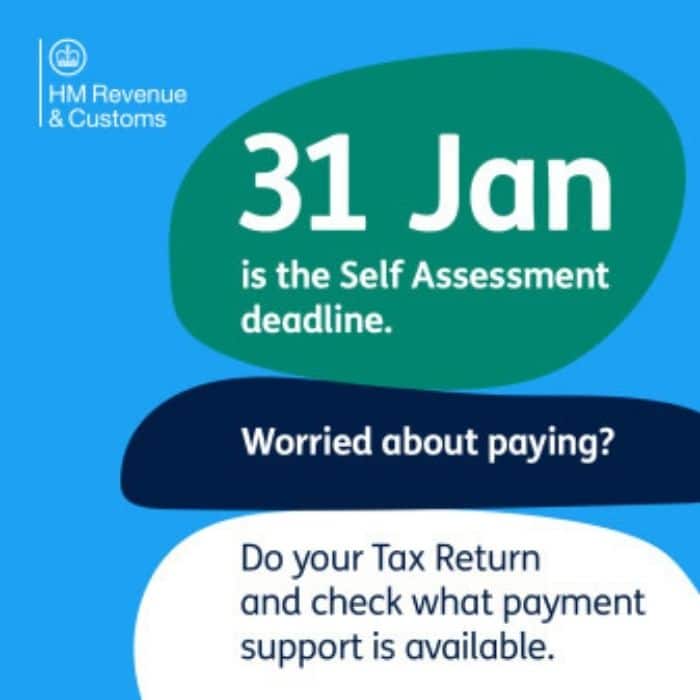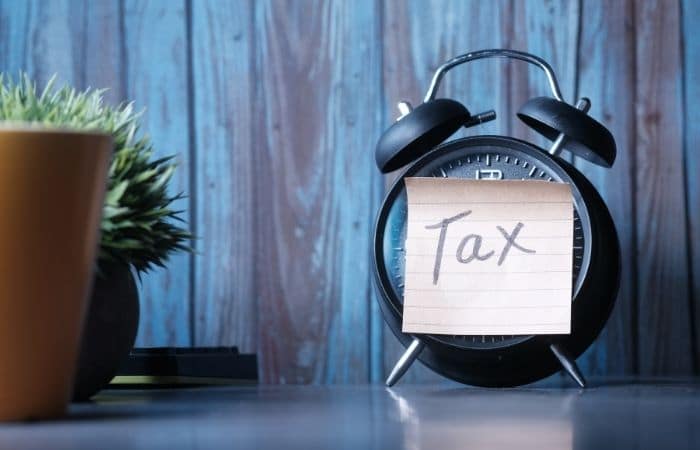The deadline to complete the Self-Assessment return to HMRC is on 31 January. But what can you do if you can’t afford to pay your tax bill?

£10 sign up bonus: Earn easy cash by watching videos, playing games, and entering surveys.
Get a £10 sign up bonus when you join today.
Join Swagbucks here >>
There are around 5 million self-employed people who have less than a month to complete their tax return by the deadline.
In total, some 12.2 million tax returns are expected to be filed for this year, and more than half have already filed their returns (93% of people file them online).
It can take some time to complete the Self-Assessment, so it’s better to do it sooner than wait until the last minute.
You may be dreading completing the assessment, as you’ll get a tax bill that you might not be able to pay.
Can’t afford your tax bill
Once the Self-Assessment has been completed online, you will know exactly how much tax is owed to HMRC.
If you cannot afford to pay it all, please, please, don’t bury your head in the sand.
A debt with HMRC isn’t one that will go away. If you leave it and try to forget about it, you will have fees and charges added for late payment. Instead, even if you cannot afford it, there are some actions you can take.
HMRC Time to Pay

You’re able to set up a payment plan to help spread the cost of the tax liability.
You can spread the cost if you own up to £30,000 and don’t have another payment plan set up with HMRC.
Use the online Time to Pay facility in your Government Gateway account and set up a direct debit, making the payments easier for you to manage.
If you have more money at any point, you can make a larger payment to bring your debt down quicker.
If you owe more than £30,000, or it’s after 60 days from the payment deadline, you won’t be able to use the online service, and you should call the Self Assessment Payment Helpline on 0300 200 3822.
Still can’t afford it?

It would be best if you evidenced to HMRC that you genuinely cannot afford to pay in full right now, but believe that you will in the future.
Go through your income and expenditures so you can show what you can afford to pay. HMRC won’t ask you to pay more than 50% of your disposable income.
They will then work out a payment plan and instalment dates. You will need to pay interest on any late amount (but you won’t pay any penalties).
Be aware that if you don’t keep up with repayments, they will usually cancel the instalments and take legal action against you. It’s therefore worthwhile making sure the amount you offer is affordable to you.
Spreading payments may still be a stretch too far for your budget.
If you need longer than 12 months to pay the tax repayments, call the Self Assessment Payment Helpline on 0300 200 3822.
Other options

Looking at where you stand with fresh eyes may help you work out what you can do, but you may need to make some hard choices.
Increase your income
Can your business adapt to what’s going on in the world and offer different services?
Can you get a PAYE job or start a new business entirely to bring in extra money?
Are you claiming all the benefits you’re entitled to?
Redo your budget
Don’t just think about your personal budget; what does your business budget look like?
Is there anything you can cancel or cut back on?
When our income took a hit in the past, we had no choice but to serve notice on the office we rented. We also cancelled services and lowered the level of service we received from some companies to free up cash each month.
Sell stuff
While it’s not what you may want to do, you may be able to make some extra cash by selling some of your things.
Whether it’s office equipment, a spare car or things from around the home. This will help with cash flow.
Business Debtline
We often talk about the National Debtline and StepChange when it comes to personal debt, but if you’re self-employed, there is a specialist service available to you.
Business Debtline is a free, confidential debt advice service for self-employed and small businesses.
You can access Business Debtline by phone, via webchat, or get advice through the website.
Get in touch with them for help that’s available to you and your business.
What happens if you don’t pay tax?

Even if you don’t think you can afford to pay and have financial difficulties, you MUST get in touch with HMRC immediately. Please don’t put it off.
At first, if you don’t pay, they will start to add interest to the taxes you owe, which will make your unmanageable debt get even bigger.
If you’re late, even if you don’t need to pay any tax, they will charge a £100 fixed penalty. After 3 months, they will charge £10 a day (up to £900), after 6 months, a penalty of 5% of the tax due or £300 (whichever is greater), then after 12 months they’ll charge 5% or £200 (whichever is greater)
You will be charged additional penalties when your payment is 30 days late, again when it’s 6 months late and get another at 12 months.
Plus, HMRC charges late payment interest and repayment interest. You can do a calculation online to get an idea of how much the penalties may be.
If you can pay, you should pay, or it can lead to enforcement action.
Avoid any action by calling them and paying HMRC in instalments.
Options HMRC could take (in no particular order) include:
- collecting what you owe through your earnings or pension
- asking debt collection agencies to collect the money
- taking things you own and selling them (if you live in England, Wales or Northern Ireland)
- taking money directly from your bank account or building society (if you live in England, Wales or Northern Ireland)
- taking you to court
- making you bankrupt
- closing down your business
If you are struggling for HRMC to agree on an instalment plan, first ask to be referred to someone more senior and get a response in writing.
Contact TaxAid, a UK charity that helps people with low incomes with tax problems, can help resolve any HMRC issues.
Be sure to go directly to www.gov.uk/hmrc (rather than clicking links in random emails or text messages) to avoid phishing scams and copycat websites. The last thing anyone needs is to be scammed for money don’t have.
Read next:
5 pro tips – running a business from home
Millions of people missing out on refund from HMRC
How to easily claim the Working From Home Tax Relief
- Where kids eat free this summer 2024 - 9 July 2024
- The Sun £9.50 Holiday – guide to a cheap UK break - 9 July 2024
- How to get FREE food and drinks – apps and other ideas - 9 July 2024

Leave a Reply